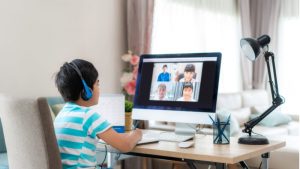Reps. Jim Langevin, D-R.I., and Doris Matsui, D-Calif., introduced a bill Oct. 16 to improve cybersecurity at K-12 schools. The Enhancing K-12 Cybersecurity Act would work to promote more access to security information, better track attack trends, and increase the number of cybersecurity experts in schools.
The U.S. Department of Agriculture (USDA) is investing $72 million in distance learning and telemedicine infrastructure in 40 states, Puerto Rico, and the Virgin Islands.
The Mooresville School District, in Indiana, has launched what is being dubbed “the classroom of the future” just in time for the 2020-2021 school year.
Pepperdine University announced today that it has upgraded more than 160 classrooms to enable hybrid learning.
As the 2020-21 school year kicks off primarily online, a new survey shows that while most teachers are confident in their ability to successfully teach students this fall, the majority of parents are less than confident in schools’ ability to provide high-quality education.
As colleges and schools across the country are having to adapt to distance or hybrid learning, Missouri University of Science and Technology is turning its attention to the challenging task of making science laboratory courses virtual.
Michigan Governor Gretchen Whitmer announced that she is dedicating $65 million in Federal Coronavirus Aid, Relief, and Economic Security (CARES) Act dollars to Michigan K-12 school districts and higher education institutions to fund, among other matters, the technology needed to engage in remote or hybrid learning.
New research from London-based Pearson finds that three-quarters of respondents to its Global Learner Survey believe that the coronavirus pandemic has “fundamentally changed” education toward more technology-centric delivery modes, with two-thirds of those surveyed saying that educational institutions need to improve their technology services to keep up with the trend.
The Hawaiʻi State Department of Education (HIDOE) announced the launch of its ʻOhana Help Desk, which will provide self-service and chat support for families experiencing issues connecting to HIDOE systems remotely from home. In an Aug. 4 press release, HIDOE said the state has invested $1.7 million to establish the help desk.
In light of the COVID-19 pandemic, the Mississippi Department of Education (MDE) is working with local school districts statewide to implement two new pieces of legislation designed to give school districts the technology they need to facilitate distance learning.













